Rideshare background checks examine your criminal history (past 7 years in most states), driving record (typically 3 years), sex offender registry status, and employment eligibility. Understanding exactly what platforms like Uber, Lyft, and DoorDash review helps prospective gig economy drivers prepare their applications. This knowledge also helps you avoid common screening delays that can extend waiting periods from 7-10 days to several weeks.
Key Takeaways
- Your driving record from the past 3 years is scrutinized for violations including DUIs, reckless driving, license suspensions, at-fault accidents, and moving violations.
- Serious disqualifying offenses include violent crimes, sexual offenses, felonies involving property damage or theft, drug-related convictions, and driving-related criminal charges.
- The screening process typically takes 7-10 business days but can extend to 3-4 weeks if county court records require manual verification.
- Uber, Lyft, and DoorDash use third-party background check providers that search nationwide databases, county courthouses, federal records, and the National Sex Offender Registry.
- Minor offenses over 7 years old, single speeding tickets (non-excessive), and dismissed charges generally won't disqualify you.
- Background check results remain valid for annual rechecks, but platforms conduct continuous monitoring that may flag new violations between scheduled screenings.
- Disputed information can be challenged through the background check provider within specific timeframes mandated by the Fair Credit Reporting Act (FCRA).
What Information Rideshare Companies Actually Check
Rideshare platforms conduct comprehensive screenings that examine multiple aspects of your history. These checks assess safety risk and driving competence. The multi-layered background checks combine driving records, criminal history searches, sex offender registry checks, and identity verification. The depth and scope of these screenings exceed what most traditional employers conduct.
The screening process searches various databases and public records simultaneously. You might see your driving record cleared within 3-4 days. Meanwhile, county-level criminal searches may take another week to complete. This staggered timeline often confuses applicants.
Understanding what appears in these background check categories helps you anticipate potential red flags. The transparency allows you to gather documentation for items that might require explanation. This preparation potentially accelerates approval timelines.
Criminal History Search Scope and Timeframes
Rideshare background checks examine criminal records through multi-jurisdictional database searches. These include county, state, and federal court records from every location where you've lived. Most platforms review the past 7 years of criminal history. However, some states mandate shorter lookback periods.
The criminal background screening process checks several specific sources:
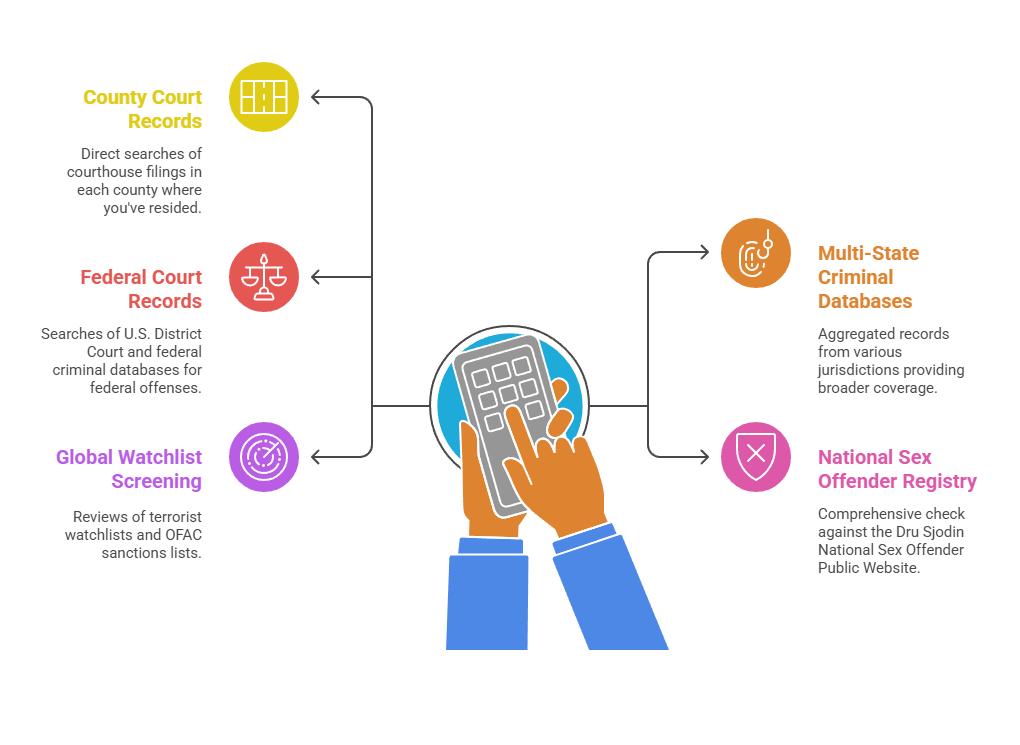
- County court records: Direct searches of courthouse filings in each county where you've resided
- Multi-state criminal databases: Aggregated records from various jurisdictions providing broader coverage
- Federal court records: Searches of U.S. District Court and federal criminal databases for federal offenses
- National Sex Offender Registry: Comprehensive check against the Dru Sjodin National Sex Offender Public Website
- Global watchlist screening: Reviews of terrorist watchlists and OFAC sanctions lists
County-level searches represent the most reliable component. However, they create the longest delays when courthouses require manual record retrieval. Background check providers must verify records belonging to the correct individual.
EXPERT INSIGHT: The truth about rideshare background checks is that they go far beyond paperwork—they’re about trust, safety, and shared responsibility. It breaks my heart to see how one delay or missed detail can impact a driver's business or a business's reputation. As those working in HR and Compliance can imagine, it's a struggle every day to balance keeping communities safe against inadvertently punishing those working to rebuild or move forward. Every form is filled out in hope of providing for one's loved ones. Every approval is a community entrusting that individual to carry out their work. Today, it's not just about fairness in background checks - it's not just about keeping communities or companies safe - it's not just paperwork - it's our values in action. - Charm Paz, CHRP
Driving Record Examination Details
The driving history component reviews your Motor Vehicle Record (MVR) from your state's Department of Motor Vehicles. This typically covers the past 3 years of documented driving activity. The MVR report shows all moving violations, at-fault accidents, and license suspensions or revocations. It also displays DUI/DWI convictions and current license status.
| Driving Record Element | Lookback Period | Disqualification Threshold |
| DUI/DWI convictions | 7 years | Any occurrence typically disqualifies |
| Major moving violations | 3 years | 2+ incidents or single severe violation |
| At-fault accidents | 3 years | 3+ accidents or 1 with serious injury |
| License suspensions | 3 years | Any suspension typically disqualifies |
| Reckless driving | 7 years | Any conviction typically disqualifies |
Minor traffic violations like single speeding tickets (less than 20 mph over limit) don't typically trigger disqualification. However, accumulating multiple moving violations within the 3-year window suggests unsafe driving patterns.
Automatic Disqualifications Across Major Platforms
Certain offenses trigger immediate and permanent disqualification from rideshare driving. The timing doesn't matter. Neither do the circumstances surrounding the incident. These absolute barriers reflect both legal liability concerns and brand reputation considerations.
The distinction between absolute disqualifications and conditional ones matters significantly. Some offenses permanently bar you from gig economy driving jobs. Others only disqualify you within specific timeframes. The three major platforms maintain similar but not identical standards.
Criminal Offenses That Permanently Disqualify Drivers
Violent crimes and sexual offenses carry lifetime bans from all major rideshare platforms. These include murder, manslaughter, sexual assault, rape, kidnapping, and child abuse. Human trafficking and any crime requiring sex offender registration also result in permanent disqualification. Platforms permanently disqualify applicants with terrorism-related offenses, felony assault convictions, and crimes involving minor victims.
Additional permanent disqualification categories include:
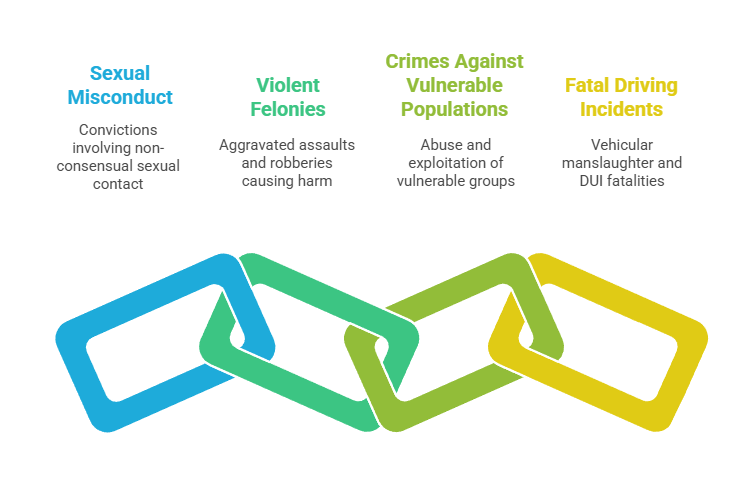
- Sexual misconduct: Any conviction involving sexual contact without consent, solicitation, or indecent exposure
- Violent felonies: Aggravated assault, armed robbery, arson involving injury, or domestic violence with serious bodily harm
- Crimes against vulnerable populations: Elder abuse, assault on healthcare workers, or exploitation of disabled individuals
- Fatal driving incidents: Vehicular manslaughter, hit-and-run resulting in death, or DUI crashes causing fatalities
The platforms maintain these strict standards because passenger safety represents their core value proposition. Any compromise on serious violent or sexual offenses would fundamentally undermine public trust.
Time-Limited Disqualifying Offenses
Many criminal and driving offenses disqualify applicants only within specific timeframes. After these periods pass, the conviction no longer impacts rideshare eligibility. Felony convictions for property crimes, drug offenses, fraud, or theft typically disqualify drivers for 7 years. This period starts from the conviction date or release date (whichever is later).
| Offense Category | Uber Policy | Lyft Policy | DoorDash Policy |
| DUI/DWI | 7 years | 7 years | 7 years |
| Drug-related felonies | 7 years | 7 years | 7 years |
| Property damage felonies | 7 years | 7 years | 7 years |
| Theft/burglary | 7 years | 7 years | 5-7 years |
| Reckless driving | 7 years | 7 years | 3-5 years |
| Driving without insurance | 3 years | 3 years | 3 years |
Misdemeanor offenses generally carry shorter disqualification periods. Misdemeanor assault (non-domestic), drug possession, or property damage typically disqualify for 3-5 years. The severity determines the exact timeframe.
How Uber, Lyft, and DoorDash Background Checks Compare
All major gig economy platforms conduct thorough screenings. However, their specific requirements and disqualification standards vary. These differences stem from each company's risk assessment models. The specific services they provide also influence their standards. A driver rejected by one platform may qualify for another.
Uber Background Check Requirements
Uber examines 7 years of criminal history and 3 years of driving records in most markets. The company disqualifies drivers with violent crimes, sexual offenses, and terrorism-related activities. Fatal accidents or any felony within the past 7 years also result in rejection. Uber automatically rejects applicants with DUI convictions less than 7 years old. Having more than 3 moving violations in 3 years or license suspensions within 3 years also disqualifies applicants.
Uber's screening examines these specific elements:
- Identity verification: Social Security Number validation and address history confirmation
- Driving record review: Full 3-year MVR from your state DMV including all violations and accidents
- Criminal database searches: County-level criminal records in all jurisdictions where you've lived
- National registry checks: Sex offender registry verification and federal court record searches
The typical Uber background check completes in 7-10 business days. Complex histories involving multiple states or counties may extend to 2-3 weeks.
Lyft and DoorDash Screening Differences
Lyft maintains screening standards nearly identical to Uber. The platform uses the same 7-year criminal lookback and 3-year driving record review. The primary difference lies in how Lyft evaluates borderline cases. The platform has implemented more nuanced review for certain offense categories.
DoorDash implements slightly more lenient standards. Delivery drivers don't transport passengers, which influences their policies. The screening remains comprehensive. DoorDash typically disqualifies violent crimes, sexual offenses, and DUI convictions within 7 years. However, the platform may approve drivers with property crime convictions after 5 years rather than 7.
Key DoorDash policy distinctions include:
- Reduced lookback periods: Some offense categories only reviewed for 5 years rather than 7
- Flexible moving violation thresholds: Up to 3 minor traffic violations may be acceptable without accompanying accidents
- Conditional approvals: Some borderline applications receive provisional approval with more frequent monitoring
These variations mean strategically applying to platforms aligned with your specific background increases approval likelihood. A driver with a 6-year-old burglary conviction might face rejection from Uber and Lyft but approval from DoorDash.
The Background Check Process Timeline and Stages
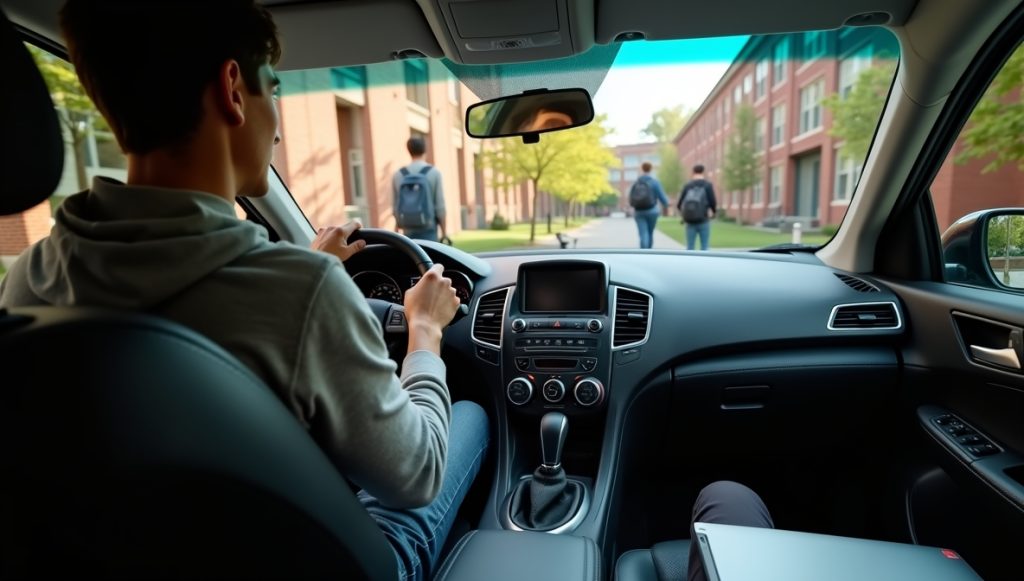
The rideshare background check unfolds in distinct phases. These phases progress at different speeds depending on the complexity of your history. Most applicants receive results within 7-10 business days. However, some checks extend to 3-4 weeks.
Initial Application to First Status Update
After submitting your rideshare application with personal information, the background check initiates automatically within 24 hours. You'll receive an email from the background check provider. This email requests consent for the screening and confirms your information. The initial verification stage takes 1-2 days as the system validates your identity.
The first substantive updates usually arrive within 3-5 business days. These updates come when automated database searches return results. Initial findings come from aggregated criminal databases and the National Sex Offender Registry. Electronic MVR systems also provide data. Many applicants with clean records receive approval within this first week.
Delays beyond 5-7 days typically indicate that additional verification is required:
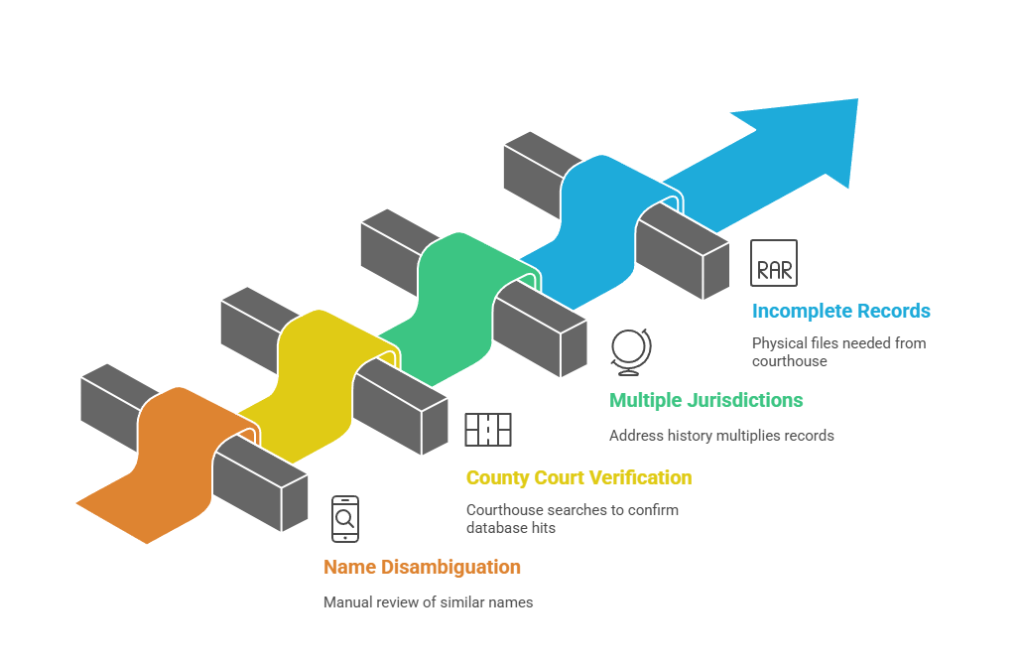
- Common name disambiguation: Your name matches multiple individuals requiring manual review
- County court verification: Database hits require confirmation through direct county courthouse searches
- Multiple jurisdictions: Extensive address history multiplies the records needing individual verification
- Incomplete records: Database entries lack sufficient detail, necessitating courthouse staff to pull physical files
If your status shows "pending" beyond 10 business days, contact the background check provider directly.
When and Why Background Checks Take Longer
Background checks extend to 2-4 weeks primarily due to county courthouse inefficiencies. Verification requirements mandated by Fair Credit Reporting Act accuracy standards also cause delays. When automated databases flag a potential criminal record match, the provider must verify that record through the original source. Some counties provide electronic access to records, returning results in 2-3 days. Others require mailed requests taking 10-15 business days.
Complex histories involving multiple states significantly extend timelines. Each county where you've lived requires separate verification. Someone who lived in five different counties might wait 3-4 weeks. A lifelong resident of one county may clear in 5 days.
Additional factors causing extended timelines include name variations and common names requiring disambiguation. Sealed or expunged records needing verification also create delays. Court backlogs and out-of-state licensing complications further extend processing times. If your background check exceeds 15 business days without explanation, contact the screening company for a status update.
What Happens During the Waiting Period
During the background check processing period, the screening company conducts simultaneous searches across multiple databases. Criminal database queries typically complete within 48-72 hours. However, verification of positive matches requires additional time. County courthouses operate on varying schedules and processing speeds.
Your driving record usually processes faster than criminal history checks. Most state DMV systems provide electronic MVR access. This allows background check providers to retrieve records within 24-48 hours. Identity verification through Social Security Number validation also completes quickly, typically within the first day.
The longest delays occur during the verification phase. Background check providers must confirm that flagged records actually belong to you. This prevents mistaken identity issues. The verification requires contacting county clerks or accessing physical courthouse records. These manual processes introduce human processing time and potential delays.
Common Issues That Appear on Background Checks
Even applicants who believe they have clean records encounter unexpected items. These surprises range from clerical errors to mistaken identity matches. Legitimately forgotten minor offenses also appear. Understanding common categories of background check issues helps you proactively identify potential problems.
The gap between what you remember and what appears in official records creates confusion. You might not realize that a speeding ticket from three years ago appears on your driving record. Background checks report raw data from official sources.
Dismissed Charges and Expunged Records
Charges that were dismissed, reduced, or resulted in acquittal frequently appear in background check results. They appear even though they didn't lead to conviction. Criminal database searches pull case filings. These include all charges initially filed by prosecutors regardless of final disposition.
Expunged or sealed records present unique complications. Commercial databases don't always reflect these changes promptly. An expunged conviction from 2018 might still appear in an aggregated criminal database. When this occurs, you must provide documentation of the expungement order.
Steps to address dismissed or expunged records that incorrectly appear:
- Obtain official court documentation: Request certified copies of dismissal orders or expungement orders from the courthouse
- Contact the background check provider: Submit a dispute through their online portal with your court documentation
- Assert your FCRA rights: Background check companies must investigate disputes within 30 days
- Follow up with the platform: Ensure the rideshare platform receives the updated version
The FCRA protects you against inaccurate reporting. However, you must proactively initiate the correction process.
Driving Record Discrepancies and Violations
Motor Vehicle Records sometimes contain errors. These include violations attributed to the wrong driver or accidents where fault was incorrectly assigned. MVR errors occur when DMV systems incorrectly match violations to driver's license numbers. An administrative license suspension that was successfully appealed might still appear active.
| MVR Issue Type | Cause | Resolution Method |
| Incorrect violation attribution | DMV data entry error | Request MVR correction from state DMV |
| Outdated suspension status | Court dismissal not reported to DMV | Submit court order showing suspension lift |
| Wrong fault determination | Police report error | Provide accident report or court ruling |
| Duplicate violations | Same incident reported by multiple jurisdictions | Contact DMV to merge duplicate entries |
Correcting MVR errors requires working directly with your state's Department of Motor Vehicles. Request your official MVR independently before applying to rideshare platforms. This allows you to address any discrepancies in advance.
How to Dispute Background Check Errors
The Fair Credit Reporting Act provides specific rights and procedures. These apply when background checks contain inaccurate information. Understanding these rights and following the proper dispute process can reverse false disqualifications. The dispute process has defined timelines and obligations.
Background check companies must investigate disputes within 30 days. They must remove or correct information they cannot verify as accurate. This legal requirement gives you leverage when errors appear.
Identifying Reportable Errors vs. Accurate Records
Not every item on your background check qualifies as a dispute. You can only challenge factually inaccurate information. You cannot dispute accurate reports of actual violations or convictions. An accurate report of a DUI conviction isn't disputable just because you disagree with the policy. However, a background check showing a DUI when you were actually convicted of reckless driving represents a factual error.
Legitimate grounds for background check disputes include:
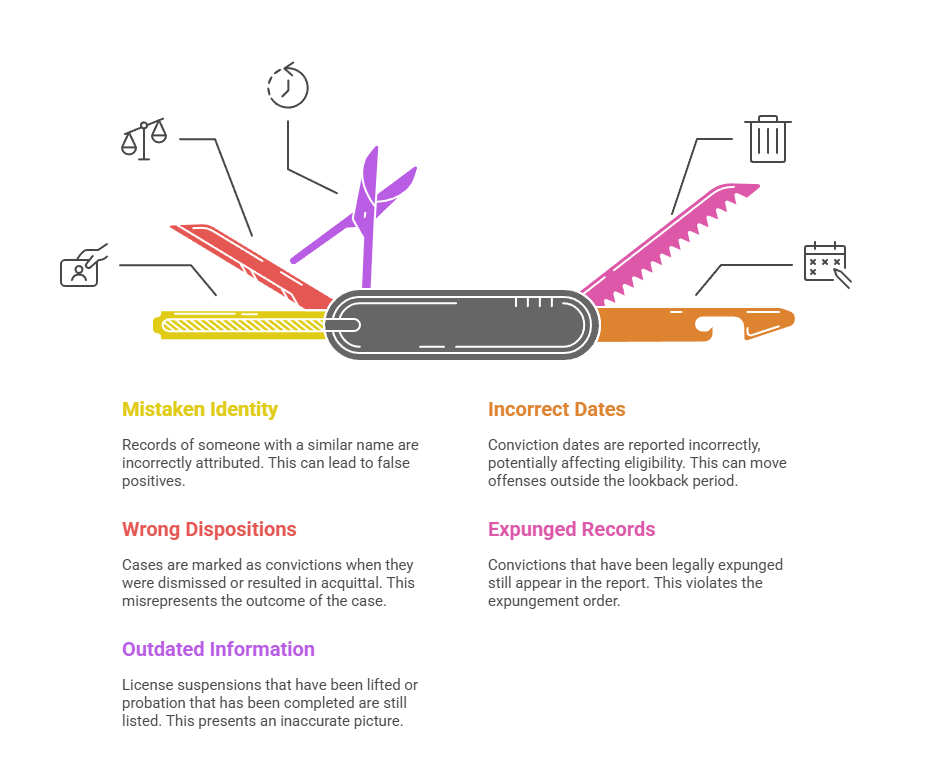
- Mistaken identity: Records belonging to someone with a similar name incorrectly attributed to you
- Incorrect dates: Conviction dates reported incorrectly, potentially moving the offense outside the lookback period
- Wrong dispositions: Cases marked as convictions that were actually dismissed or resulted in acquittal
- Expunged records: Convictions legally expunged but still appearing in the report
- Outdated information: License suspensions that have been lifted or probation that has been completed
Before disputing, obtain official documentation proving the error. These documents form the foundation of successful disputes.
Step-by-Step Dispute Filing Process
When you identify inaccurate information in your rideshare background check, initiate the dispute immediately. Use the background check company's designated FCRA dispute process. This typically means logging into the candidate portal. You can select specific items to dispute and upload supporting documentation.
The formal dispute process follows these stages:
- Submit written dispute: File through the online portal or mail a dispute letter via certified mail
- Background check company investigation: The company must contact the original information source within 30 days
- Results notification: You'll receive written notice of investigation results
- Updated report distribution: The background check company must send updated reports to the rideshare platform
- Platform reconsideration: Contact the rideshare company to ensure they review your corrected background check
Throughout this process, maintain copies of all correspondence and documentation. If the background check company fails to investigate within 30 days, you may file complaints. The Consumer Financial Protection Bureau and Federal Trade Commission enforce FCRA compliance.
Understanding Your Rights During Background Screening
The Fair Credit Reporting Act grants specific protections to applicants undergoing employment background checks. You have the right to know when a background check influences an employment decision. Applicants must receive a copy of the background check report. The law also grants you the right to dispute inaccurate information.
Before a rideshare platform rejects your application based on background check findings, they must provide pre-adverse action notice. This notice gives you time to review the report and dispute errors. The platform must wait a reasonable period (typically 5-7 business days) before finalizing the rejection. This waiting period allows you to correct inaccuracies that might reverse the decision.
Understanding these rights empowers you to take action when facing potential disqualification. Many applicants don't realize they can challenge background check findings. They assume the decision is final. However, FCRA protections specifically address this situation. The law recognizes that background check errors occur and provides remedies.
Conclusion
Understanding what shows up on a rideshare background check empowers prospective drivers to assess their eligibility realistically. The comprehensive screening examines 7 years of criminal history and 3 years of driving records. Platforms like Uber, Lyft, and DoorDash maintain similar but distinct standards. When errors appear, the FCRA provides clear dispute rights that can correct inaccurate information.
Frequently Asked Questions
How long does a rideshare background check take?
Most rideshare background checks complete in 7-10 business days. Complex histories involving multiple states may extend to 2-4 weeks. Delays occur when county courthouses require manual record retrieval. Common names necessitating additional verification also cause delays.
What disqualifies you from driving for Uber or Lyft?
Violent crimes, sexual offenses, and DUI/DWI within 7 years disqualify drivers. Felonies within 7 years and more than three moving violations in 3 years also result in rejection. License suspensions within 3 years disqualify applicants. Any crime requiring sex offender registration permanently bars rideshare driving.
Do dismissed charges show up on rideshare background checks?
Yes, dismissed charges often appear in background check results. Criminal database searches pull initial case filings regardless of final disposition. Background check companies should clearly mark these as dismissed. However, older database records sometimes lack complete outcome information.
Can I drive for DoorDash if I was rejected by Uber?
Possibly. DoorDash implements slightly more lenient standards for certain offense categories. Delivery drivers don't transport passengers, which influences policies. DoorDash may accept drivers with property crime convictions after 5 years rather than 7. However, serious offenses like violent crimes still disqualify across all platforms.
How far back do rideshare background checks go?
Criminal history checks typically review the past 7 years. Driving records examine the past 3 years in most markets. Some states mandate shorter lookback periods under fair chance hiring laws. Serious offenses like sexual crimes create permanent bars regardless of timeframe.
What happens if my background check shows incorrect information?
Under the Fair Credit Reporting Act, you have the right to dispute inaccurate information. The background check provider must investigate within 30 days. Gather official documentation proving the error. Submit a formal dispute through the background check company's portal with supporting documents attached.
Will a 10-year-old DUI disqualify me from rideshare driving?
No. DUI convictions outside the 7-year lookback period don't appear in rideshare background checks. The 7-year window starts from the conviction date or release date (whichever is later). If the conviction required ongoing monitoring extending into the lookback period, it may still appear.
Do rideshare companies conduct continuous background monitoring?
Yes. Major platforms like Uber and Lyft conduct annual rechecks. They also use continuous monitoring that may flag new violations between scheduled screenings. New serious offenses like DUI convictions can trigger mid-term deactivation. This ongoing monitoring ensures driver safety standards remain current.
Additional Resources
- Understanding Your Rights Under the Fair Credit Reporting Act
https://www.consumer.ftc.gov/articles/pdf-0096-fair-credit-reporting-act.pdf - Uber Background Check Requirements and Process
https://www.uber.com/us/en/drive/requirements/ - Lyft Driver Requirements and Background Check Policy
https://www.lyft.com/driver/requirements - DoorDash Background Check and Approval Process
https://help.doordash.com/dashers/s/article/Background-Checks - How to Request and Review Your Motor Vehicle Record
https://www.dmv.org/driving-record.php
Still have questions?
Get in touch with our team today for a personalized demo and discover how our tailored volume pricing and packages can drive results for your business!
How useful was this page?*
Note: your comments are anonymous. We use them to improve the website. Do not include any personal details.
Visit our FCRA Compliance Tool or leave a message here if you need a response.
From the blog Explore the GCheck Content Hub

How Long Does a Background Check Take? A Complete 2025 Guide
13 Dec, 2023 • 14 min read
The Ultimate Background Check Guide
13 Dec, 2023 • 4 min read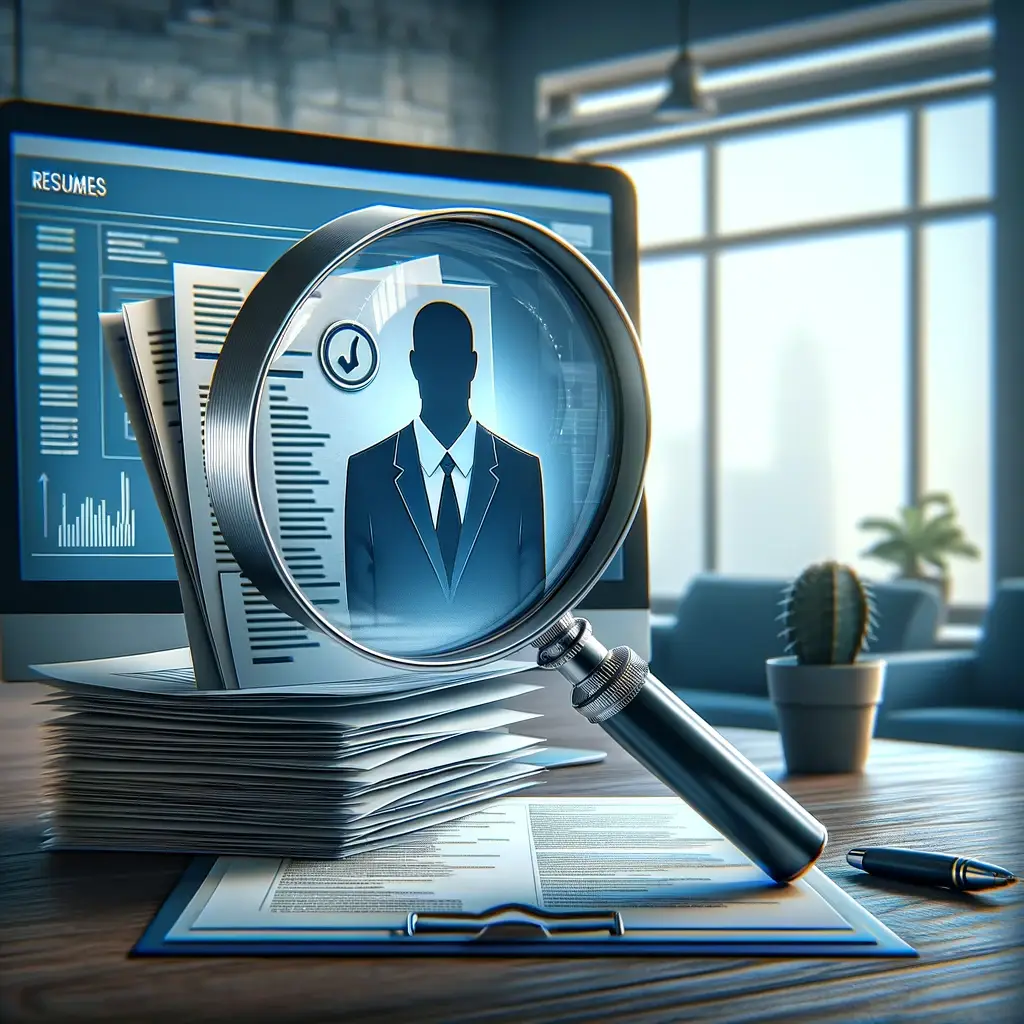
The Ultimate Guide to Employment Background Checks
13 Dec, 2023 • 10 min readThe information provided in this article is for general informational and educational purposes only and should not be construed as legal advice or a substitute for consultation with qualified legal counsel. While we strive to ensure accuracy, employment screening laws and regulations—including but not limited to the Fair Credit Reporting Act (FCRA), Equal Employment Opportunity Commission (EEOC) guidelines, state and local ban-the-box laws, industry-specific requirements, and other applicable federal, state, and local statutes—are subject to frequent changes, varying interpretations, and jurisdiction-specific applications that may affect their implementation in your organization. Employers and screening decision-makers are solely responsible for ensuring their background check policies, procedures, and practices comply with all applicable laws and regulations relevant to their specific industry, location, and circumstances. We strongly recommend consulting with qualified employment law attorneys and compliance professionals before making hiring, tenant screening, or other decisions based on background check information.


